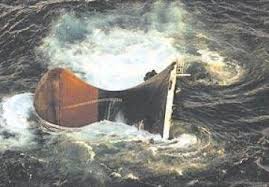Luke Allen – Military Political Analyst – Makati, Manila – lukeallenmanila@journlist.com
Manila, Philippines – July 25, 2024 – A significant environmental disaster looms as the MT Terra Nova, an oil tanker transporting 1.4 million liters of industrial fuel, sank in Manila Bay after encountering massive waves on Thursday night. The Philippine Coast Guard (PCG) has successfully rescued all the crew members, though tragically, one crew member was recovered deceased.
The MT Terra Nova, which departed from Bataan and was en route to Iloilo, faced turbulent waters that led to its sinking in 34 meters of water, according to Rear Admiral Balilo of the Philippine Coast Guard. The incident occurred despite the vessel being equipped for heavy seas, highlighting the unpredictability of maritime conditions in the region.
An initial aerial survey conducted by the PCG revealed a 3.7-kilometer oil spill near the sinking. At this stage, it remains uncertain whether the spill originated from the tanker’s cargo of industrial fuel or the ship’s fuel reserves. However, the potential for a major environmental disaster is significant, prompting urgent containment efforts.
The PCG and other maritime authorities have mobilized a comprehensive response to manage the oil spill. Containment booms and skimmers are being deployed to mitigate the spread of the oil, while chemical dispersants are being considered to break down the oil on the water’s surface. Additionally, marine biologists and environmental experts have been called in to assess the potential impact on the marine ecosystem, which includes vital fishing grounds and sensitive coastal habitats.
“We are doing everything in our power to contain the spill and prevent further environmental damage,” said Rear Admiral Balilo in a press briefing. “Our immediate priority is to secure the area and ensure the safety of our coastal communities and marine life.”
The incident has drawn the attention of environmental groups and local government units, urging swift action to address the potential catastrophe. “The sinking of the MT Terra Nova is a stark reminder of the dangers posed by maritime transport of hazardous materials,” said Maria Santos, a spokesperson for the environmental organization Kalikasan. “We need to ensure that all possible measures are taken to protect our marine environment and the livelihoods of those who depend on it.”
Local fishermen have expressed their concerns about the immediate and long-term impacts of the spill on their livelihoods. “We rely on these waters for our daily catch. An oil spill of this magnitude could devastate our fish stocks and affect our income for months, if not years,” said Juan de la Cruz, a fisherman from a nearby coastal community.
The Philippine government is expected to launch a thorough investigation into the incident to determine the cause of the tanker’s sinking and hold any parties responsible for safety lapses accountable. Initial reports suggest that the vessel may have been caught off guard by the sudden and severe weather conditions, but further investigation is needed to confirm these details.
In the meantime, the Department of Environment and Natural Resources (DENR) has issued an advisory warning residents along the coast to avoid contact with the spilled oil and to report any signs of contamination or affected wildlife. Depending on the extent of the spill and the effectiveness of the containment measures, cleanup efforts are likely to take several weeks, if not longer.
As the situation unfolds, the MT Terra Nova incident is a critical reminder of the need for stringent safety protocols and preparedness in maritime operations, particularly in regions prone to volatile weather conditions. The spill’s full impact remains to be seen, but efforts are underway to minimize the damage and protect the delicate balance of Manila Bay’s marine environment.















